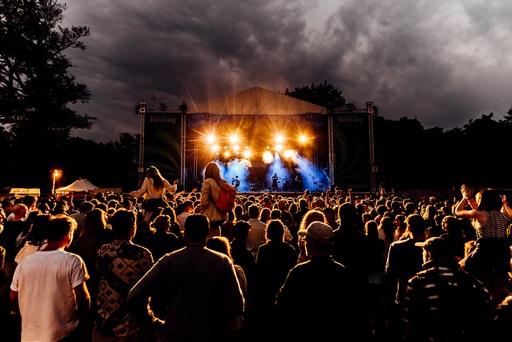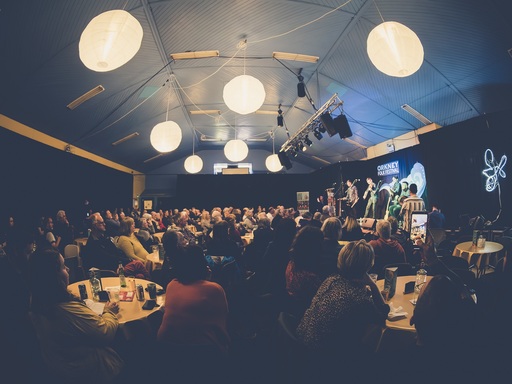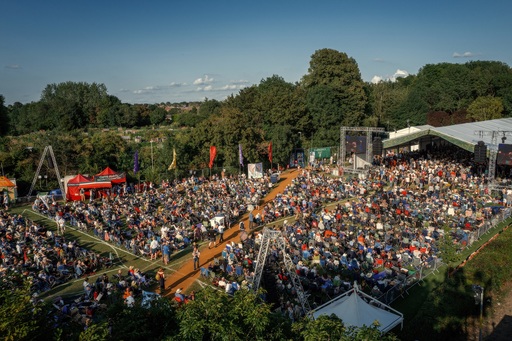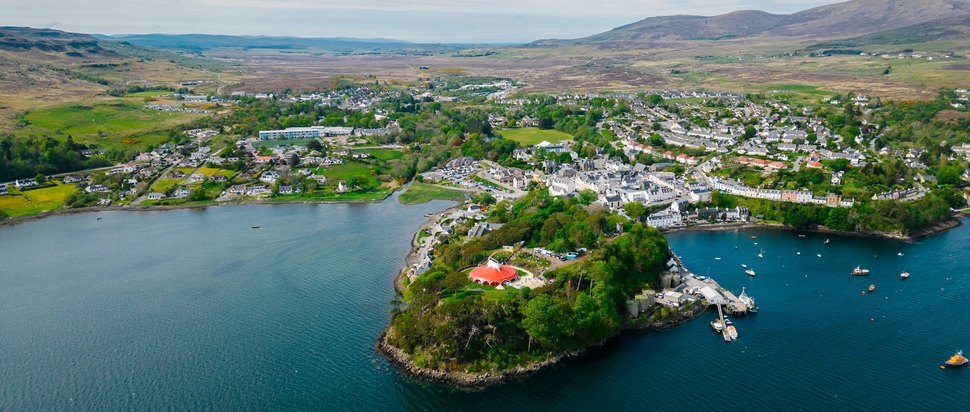From Skye to Glasgow, trad festivals continue to evolve
Scottish traditional music is experiencing a boom, with major trad and folk festivals taking centre stage. We speak to three people at the heart of the movement to find out what it's like on the inside
Scotland’s seeing a trad boom at the moment – research commissioned by Visit Scotland suggests that 34 per cent of Scots have been listening to the genre more in the past year, while bands like Talisk are enjoying a folk-specific form of Beatlemania. Last year the team behind Skye Live launched their sister festival, The Reeling, bringing their trad and celtic fusion programming to the central belt. But perhaps most importantly, Greg Davies was spotted at a late night gig during last year’s Celtic Connections. If the host of the nation’s most beloved domestic TV show is a fan of trad music festivals, anything could be happening.
Allan MacDonald plays pipes and synths in Niteworks, one of the integral acts of this cultural renaissance. He thinks people are less embarrassed by Scottish trad now – and although he asks whether ‘embarrassed’ is putting it too strongly, this is probably the best way to describe many Scots’ relationship with the genre. “A while back, there was a perception that trad music was quite twee and not that cool – I think that has changed," he says. "For us, there was an arc of it becoming more accepted and also more cool that we were traditional musicians.”
Celtic fusion acts like Niteworks make up the bulk of the new generation of successful trad acts – their sound is markedly different to previous iterations of the genre. The last wave of Celtic fusion and ‘acid croft’ music in the 90s was characterised by the same downtempo stylings as other electronic music at the turn of the millennium (it makes sense, given how many electronic acts were working with acoustic sounds). After that there was a bit of a lull, and into that lull stepped Niteworks, blending traditional melodic forms, structures and instruments with the synthesised beats of deep house and electronica.
Skye Live has been bringing Scots trad and electronic dance music together since its inception, but in recent years their programming has focused more so on the trad and Celtic fusion side. Michael Pellegrotti, Director and Programmer of Skye Live and The Reeling, says this is because the trad side of the programme is what’s drawing the crowds.
“Dance and trad have always been the key pillars of Skye Live," he says. "As genres they have a lot of similarities; there's a tribalism to both of them and that's something we like to explore in our programming. In terms of how much of either we programme these days, we've certainly tweaked the balance over the years based on what the audiences want [...] There's also a lot more crossover on the trad side than there was when the festival started, with more artists drawing on contemporary sounds.”
Malin Lewis is another Skye piper who has forged their own approach to trad music – they compose for instruments like the kantele and saxophone, and play a new adaptation of Scottish smallpipes which they crafted themselves based on a 3D-printed design. They’re returning home to play Skye Live next month.
“In the Highlands there's something beautiful about the way that folk music/Celtic music is pop music in that sense,” says Lewis “It's the mainstream of what's happening.” The influx of trad fans must be coming from the central belt, since support from up north is a constant.
Pellegrotti points out, however, that there was an audience here already; for him the decision to launch The Reeling has been a long time coming. “Glasgow is the epicentre of traditional music in Scotland, as evidenced by the size and popularity of Celtic Connections. All the biggest gigs happen here, and with the growth of festivals as a medium, it always felt surprising that there wasn't a large-scale summer event in the central belt that catered for these audiences. It got to the point where the idea felt like a bit of a no-brainer.”

Peatbog Faeries @ The Reeling. Credit: Ryan Buchanan
MacDonald keeps coming back to the energy of the current generation of trad acts as a reason for their popularity: acts that have a fiery drive when you see them in concert; acts that give you the energy to stand in a field all day. It seems like a natural outlet for a Lowlands audience, especially in Glasgow – one that is equally energetic and willing to dance.
For MacDonald, this energy is, if not created then at least facilitated by an increase in quality: “I was watching the Six Nations the other day and it got me thinking […] way back in the day, the people who used to play televised rugby just looked pathetic compared to what it is today. It's so much slicker today, it's so professional [...] the quality and the standard of everything has gotten much higher... Is that because the players are better or just because of the surroundings and the atmosphere? I think it's the latter.”
Niteworks are disbanding this year – they’ve built up a sizeable audience, but their success has brought them to a crossroads where they either have to double down or take a step back. All four have full-time jobs and couldn’t take a more intense schedule – music has always been a hobby for them.
The next generation of trad musicians coming through have come up in an era of increasing ‘professionalisation’ of the scene – the Traditional Music degree at the Royal Conservatoire of Scotland, and The National Centre of Excellence in Traditional Music at Plockton High School means that some of the acts breaking through today have been studying music intensely since they were 12 years old.
“Benny's [Benedict Morris] the perfect example. He's an absolutely phenomenal player," states MacDonald. "It's pretty cool that he's playing with Talisk. He could be playing with anyone, but the fact that the three of them are able to headline festivals with a fiddle, guitar and concertina? On paper, that ain't happening… but in reality it works."
He continues: “That definitely factored into why we're kind of drawing a line under things, because there's gonna very quickly be a point where we just can't keep up with folks that are doing it all the time [...] We certainly wouldn't want to be in a position where we're slipping more and more down on the bill. Not that the aim is to headline or what have you – I think we just wanted to avoid that.”
Lewis studied at both Plockton and RCS, as well as a year at the Sibelius Academy in Helsinki, and they say there’s a lot of conversations taking place in those schools around authenticity and ownership of stories. “When you take something out of the context and then study it in a formal way, you're not learning through that oral tradition in the same way. RCS are very considerate when they do that. And they do try to do all that oral tradition and that oral learning and that community and that folk storytelling [...] it's not black and white. It's not good or bad. But it's really interesting [...] When you institutionalise a folk idiom is it still folk? […] That in itself is PhD material.”
Lewis says all of this has encouraged them to make a debut album that is totally their own – inspired by the raw, unpolished sound of the bands they loved as a teenager (Belle and Sebastian’s out of tune singing as much as the expressive fiddle compositions of Duncan Chisholm). When it comes to the festival circuit this summer, Lewis won’t have a sax or a seven-piece band, so will have to recreate the album’s intricacies through pedals and careful repurposing of parts.
“As much as I love big bands and that wall of sound that you can create, there's also something I really love about little groups, like three or four people. I think live music is so much about the human connection on stage," Lewis says, "It's about people looking at each other and engaging.”
Niteworks release An Toll Dubh on 25 Apr via Comann Music | niteworksband.com
Malin Lewis releases Halocline on 3 May via Hudson Records | malinlewis.co.uk
Skye Live takes place on Portree, Isle of Skye, 9-11 May; Niteworks play Fri 10 May; Malin Lewis plays Sat 11 May | skyelive.co.uk
The Reeling takes place in Rouken Glen Park, Glasgow, 8-9 Jun; Niteworks play Sat 8 Jun | thereeling.com
More trad festivals for your 2024 diary
Edinburgh Tradfest
Edinburgh, Scotland, 3-13 May
Lineup: Malin Lewis, Bruce Ncube, Birdvox + Kate Young
Orkney Folk Festival
Orkney, Scotland, 23-26 May
Lineup: The Chair, Charm of Finches, Erika Shearer & Karen Tweed

Orkney Folk Festival. Image: Lieve Boussauw
The Gathering
Bught Park, Inverness, Scotland, 1 Jun
Lineup: Croft No. 5, Sian, Cala
Førde International Folk Music Festival
Førde, Norway, 3-7 Jul
Lineup: Aziza Brahim, Lina, Ímar
Kaustinen Folk Music Festival
Kaustinen, Finland, 8-14 Jul
Lineup: Antti Paalanen, Piirpauke, Ánnámáret
Tiree Music Festival
Tiree, Scotland, 12-14 Jul
Lineup: TBC

Cambridge Folk Festival. Image: Martin Bond.
Cambridge Folk Festival
Cherry Hinton Hall, Cambridge, England, 25-28 Jul
Lineup: Fantastic Negrito, Nitin Sawhney, Talisk
Lorient Interceltic Festival
Lorient, France, 12-18 Aug
Lineup: Julie Fowlis, Valtos, Cherish the Ladies
Ceòl Cholasa
Colonsay, Scotland, 19-22 Sep
Lineup: Amy Laurenson Quartet, Miguel Girão, Rura
Lochaber Live
Fort William, Scotland, 20-22 Sep
Lineup: Mànran, Shooglenifty, Hò-rò
